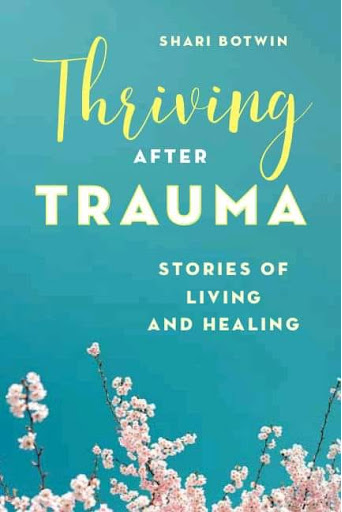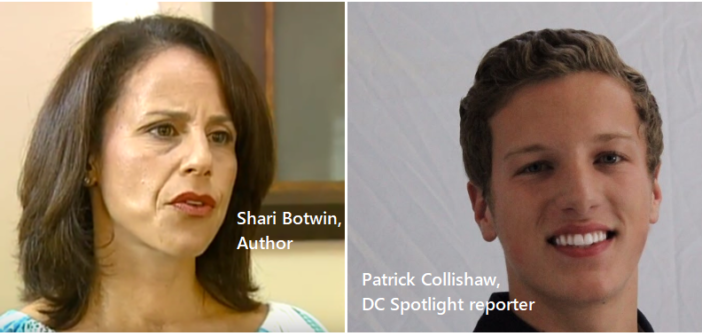 April 1, 2020
April 1, 2020
Patrick Collishaw
DC Spotlight
News Writer
Living the Life
Author Shari Botwin recently released her new book Thriving After Trauma: Stories of Living and Healing. The book addresses overcoming trauma, including physical and sexual abuse, war-related injury, and loss due to tragedy or illness and natural disasters. These real stories and practical tools shed light on how to let go of the shame, guilt, anger, and despair after a traumatic experience. Botwin has conducted keynote addresses for universities and professional conferences throughout the country. She has given expert testimony on breaking stories related to trauma from Covid-19 on a variety of international media outlets. DC Spotlight’s reporter Patrick Collishaw interviewed Botwin to get her take on the current traumatic state of the world during the coronavirus epidemic.
Patrick Collishaw: Where did your inspiration for writing this book come from? Was it a personal experience.
Shari Botwin: I’ve been wanting to write for a couple of decades. With trauma, the experience itself isn’t what connects us, it’s the way we feel after the trauma. We all have similar ways of responding. I wanted to get the message out there that you’re not alone. I wanted to help people to know that there are healthy ways to deal with trauma.
Collishaw: Can you tell me some scenarios in the book where people have gone through trauma and healing from trauma?
Botwin: There’s a story in there about an older guy — he’s now 70 — and he had a multitude of trauma histories. He grew up in the projects. His mom was very sick with untreated bipolar disorder. His dad passed away when he was two years old, so he lived decades with a traumatic, impoverished, lacking family life. He was also abused by some of his teachers at school. So when I met him, he was in his 60s, and at that point, he had suffered from PTSD and major depression for 40 years. He was hospitalized three years ago. He was doing electroconvulsive shock therapy. I met him two years ago, and ever since he’s been able to just talk about what happened and understand the impact and also learn more about his defense mechanisms…..as he learned more about that, he started coming alive. He started to be able to make connections and grieve for the losses he has dealt with….for the first time in his life he started going on vacation. He’s been singing in his house….him and his current wife started traveling, so the transformation that he has undergone, there’s no miracles, but all we’ve really been doing is talking and feeling, and in doing that he has really been coming alive. He’s a huge inspiration to me.
Collishaw: Not just Americans, but the entire world is going through one of the most traumatic experiences the world has ever gone through. How are we going to get through this and how are we going to heal?
Botwin: The way that we are going to get through it is, we need to know that it’s going to end. We need to be able to (at a time when things feel out of control) identify the things in our life that we do have control over. We need to be able to recognize that it’s a very scary thing that’s happening, especially if you have a loved one that has coronavirus. It’s important to know the facts about the virus, but also not go to the worst case scenario. Some people will die, but not everybody. So we really need to know what the facts are. I think it’s important to make space to acknowledge the frustration, isolation, the loss, especially people who had to cancel their wedding or had to come home from college and won’t be able to graduate. It’s important to recognize real feelings, but it doesn’t mean that we can’t celebrate these life events.
Collishaw: How do we keep from feeling hopeless in this situation?
Botwin: I think a lot of people feel like the world is ending since we can’t see people. But when you see your friends, when you talk to your friends (digitally), you know the world is not ending. It’s so important to keep to a schedule. It’s important to keep being active if you can: running, watching videos online, meditating, doing yoga. One thing I’m seeing that I love is a lot of the kids that were involved in things like dance and singing lessons are still having their lessons…on Zoom and on Skype. Don’t disconnect from those, even if you find it to be not as fun or you get bored or you get distracted. Keep at it. Take this time to spend time with the loved ones you live with and connect with them in ways you couldn’t before. Just remember that we are resilient. We are such a resilient group of people and in the end some good things will come out of this.
Collishaw: Right now we don’t even have access to therapists and many mental health outlets, what do we do in the meantime, and who do we lean on or look to?
Botwin: What therapists are doing is offering tele-medicine or support groups on Zoom. For someone who is already involved in treatment, definitely make sure you stay connected to your therapist or to your support group or to your different support resources. That is hugely important. This is not a time to say, ‘well, I’ll talk to you when things get back to normal.’ Now more than ever, people who are already struggling with mental health issues need to stay connected. If you don’t have those resources, and you’ve never been to therapy, that’s when you want to go online and start looking for different types of mental health outlets. You can definitely look on YouTube. They’re offering art classes. Get a coloring book, go on Amazon and look for books about healing or poems. Anything that uses words or creative strategies to instill comfort and hope.
Collishaw: What roles does spirituality play in healing from trauma?
Botwin: I think people adhere to spirituality now more than ever. Spirituality is not about religion. The role of spirituality is believing that there’s going to be something that will come out of this epidemic, believing that as bad as things can be or as bad as things were, It’s not going to be like that forever. If you stay connected to people you know love and support you, you can do anything.
Collishaw: What would you say is the biggest danger of not confronting your personal feelings/trauma after suffering a loss?
Botwin: If you don’t confront it, you’re going to end up trying to use self destructive mechanisms to numb. If you don’t confront it, you’re going to end up either developing severe PTSD, eating disorders, or start turning to alcohol or drugs to not feel.
Collishaw: What is one quote or sentence from the book that you would want everyone who has experienced trauma to hear?
Botwin: It’s in knowing and understanding and facing our trauma, that we can find ways to live fully and thrive.
GET THE BOOK:
CLICK HERE: www.rowman.com/ISBN/9781538125601/Thriving-After-Trauma-Stories-of-Living-and-Healing. To get 30% off, use the discount code RLFANDF30 at checkout.





